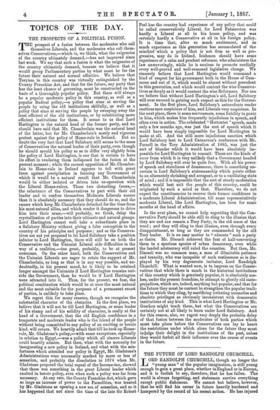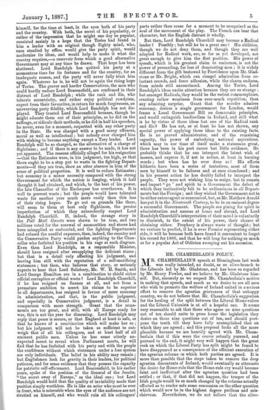THE FUTURE OF LORD RANDOLPH CHURCHILL.
-FIORD RANDOLPH CHURCHILL, though no longer the 1 "young man" of the popular imagination, is still young enough to gain a great place, whether in England or in Europe, and it is foolish to say, therefore, that he has fallen. The world is always forgetting, and statesmen survive everything except public dishonour. We cannot but believe, however, that he will find his career in future heavily burdened and hampered by the record of his recent action. He has injured
himself, for the time at least, in the eyes both of his party and the country. With both, the secret of his popularity, or rather of the impression that he might one day be popular, consisted mainly in a hope that the Tories had found in him a leader with an original though flighty mind, who, once steadied by office, would give the party spirit, would modernise its ideas, and would help to make it what the country requires,—a reservoir from which a good alternative Government may at any time be drawn. That hope has been shattered. Lord Randolph has quitted his party at a momentous time for its fortunes and for the country, for an inadequate reason, and the party will never fully trust him again. Whatever he is, he will not be again the rising hope of Tories. The graver and harder Conservatives, the men who could hardly endure Lord Beaconsfield, are confirmed in their distrust of Lord Randolph ; while the rank and file, who tolerate eccentricity, and rather enjoy political rowdyism, expect from their favourites, in return for much forgiveness, an unswerving party fidelity, which Lord Randolph has not dis- played. They trusted Lord Beaconsfield because, though he might educate them out of their principles, as he did on the suffrage, or ridicule their methods, as he did in half his speeches, he never, even for a moment, coquetted with any other party in the State. He was charged with a good many offences, moral as well as intellectual ; but nobody ever charged him with wishing to become anything except a Tory leader. Lord Randolph will be so charged, as the alternative of a charge of flightiness ; and if there is any answer to be made, it has not yet appeared. The reasons officially alleged for his resignation —that the Estimates were, in his judgment, too high, or that there ought to be a atop put to waste in the fighting Depart- ments—if they are true, show an utter absence in him of the sense of political proportion. It is well to reduce Estimates ; but economy is a minor necessity compared with the strong Government for which the nation is longing, which it half thought it had obtained, and which, to the best of his power, the late Chancellor of the Exchequer has overthrown. It is well to prevent waste ; bat the people would have tolerated waste for another year much more easily than this loss of their rising hopes. To go out on grounds like these, will seem to them at best only flightiness, the precise imperfection of which they antecedently suspect Lord Randolph Churchill. If, indeed, the strange story in the Pall Mall Gazette were shown to be true, and two millions voted for the renewal of ammunition and stores had been misapplied or embezzled, and the fighting Departments had refused the needful exposure, then, indeed, the country and the Conservative Party would pardon anything to the Chan- cellor who forfeited his position in his rage at such disgrace. Even then Lord Randolph, as a responsible Minister, should have resigned after resupplying the deficient stores ; but that is a detail only affecting his judgment, and leaving him still with the reputation of a self-sacrificing statesman ; but then, who believes that story, or seriously expects to hear that Lord Salisbury, Mr. W. H. Smith, and Lord George Hamilton are in a combination to shield either official corruption or official waste ? Lord Randolph Churchill, if he has resigned on finance at all, and not from a premature ambition to assert his claims to be superior to all departments, has resigned in favour of more economy in administration, and that, in the public judgment, and especially in Conservative judgment, is a detail in comparison with more strength. Grant that the arma- ments are too great, and still, with all Europe ready for war, this is not the year for disarming. Lord Randolph may reply that peace is secure, or that England at least is safe, or that he knows of a combination which will make her so ; but his judgment will not be taken as sufficient to out- weigh that of all his colleagues, and at least half of all eminent public men. Unless he has some utterly un- expected secret to reveal when Parliament meets, he will find that he has forfeited with his party and with the people the confidence without which statesmen under a free system are only individuals. The belief in his ability may remain ; but Englishmen look for gravity in their leaders, for political patience, and for some evidence that they possess the capacity for patriotic self-effalement. Lord Beaconsfield, in his earlier years, spoke of the position of the General of the Jesuits, "the secret away of Europe," as the ideal one ; but Lord Randolph would hold that the quality of invisibility made that position simply worthless. He is like an actor who must be ever in front, who is miserable when the eyes of the audience are not rivetted on himself, and who would ruin all his colleagues' parts rather than cease for a moment to be recognised as the soul of the movement of the play. The French can bear that character, but the English distrust it wholly.
But then, Lord Randolph Churchill may become a Radical leader I Possibly ; but will he be a great one His abilities, though we do not deny them, and though they are well adapted for Radical work, are, so far as yet developed, not great enough to give him the first position. His power of speech, which is his greatest claim to eminence, is not the power of persuading, far less of dominating men ; it is widely different from the gift bestowed by Providence upon Mr. Glad- stone or Mr. Bright, which can compel admiration from re- luctant crowds, and force adhesion, while the charm endures, from minds still unconvinced. Among the Tories, Lord Randolph's ideas excite attention because they are so strange ; but amongst Radicals, they would be the veriest commonplaces, creating rather weariness from over-much repetition, than any admiring surprise. Grant that the seceder admires economy, desires a single government for London, would frame a Local Government Bill on democratic principles, and would extinguish landlordism in Ireland, and still what is he by virtue of those ideas but one of the Radical rank and file He has not, or at least he has not shown, any special power of applying those ideas to the existing facts. He is no proved administrator, and of the remaining capacity, the power of embodying national aspirations, which may in our time of itself make a statesman great, there has been in his past career but little evidence. He probably thinks that he can interpret the latent wish of masses, and express it, if not in action, at least in burning words ; but when has he ever done so ? His efforts hitherto have been a series of tentatives, most of them seen by himself to be failures and at once abandoned ; and in his present action he has doubly failed to interpret the people. They were not wishing him to resign, but to remain and impart " go " and spirit to a Government the defect of which they instinctively felt to be ordinariness in all Depart- ments but the Foreign ; and they wished the Government not to be either extravagant or economical, but, as Mr. Matthew Arnold has put it in the Nineteenth Century, to be in an eminent degree a successful Government. The people are pining for spirit in administration and success at home and abroad, and Lord Randolph Churchill's interpretation of their mood is voluntarily to diminish, to the extent of his power, their chance of obtaining either. Prophecy is always waste of thought ; but we venture to predict, if he is ever Premier representing either side, it will be because both have found it convenient to forget his record for 1886, and that he will long for nothing so much as for a popular Act of Oblivion sweeping out his secession.















































 Previous page
Previous page